
Exciting Math for Kids
- 16 Fun Math Activities and Counting Games
Math for kids can be quite the challenge, but fortunately learning approaches means everything. There are many great ways to make learning math fun and yet still highly effective.
This is where fun math activities, printable math games,
multiplication math games, fun math games for
kids, elementary math games, kindergarten math games, preschool math
activities, and cool math games for kids come in handy.
These 16 fun math games for kids are what will make it easier for
your kids to learn.
You may not think that you have the
creativity to make your own math multiplication games or kids math
games, but the truth is that you don't need to.
You can turn
pretty much any game into a math game, and any activity can have a
focus on math.
These fun math activities are what will make
it possible for your kids to learn if you take the time to try and
make math fun for them. :-)
The Importance of Using Math Games for Kids to Make Math Fun and not Like 'Hard Work'
While you use language every day, science gives you the chance
to learn things about your body or animals around you, history
teaches you all about kings and queens and other fun things,
math can be just plain boring and practical - at least that's
how most kids see it.
For the majority of the parents
around the world, trying to get their kids to do math homework
is harder than trying to get them to clean their rooms.
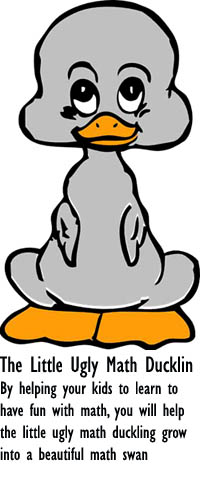
Unless your child happens to be one of the very small
percentage of children around the world that are good at or
like math very much - and, if you are, lucky you! - then it is
likely that your kid isn't going to want to do his math.
Kids often feel that they shouldn't have to spend so much
time doing all the work of adding, subtracting, counting,
multiplying, dividing, and using fractions, and so they
instinctively rebel against doing math.
This is where
the math games for kids come in!
If math is
such a challenge, that's when it becomes your challenge to
make it fun for them.
Making math for kids fun will help to
change the way they look at their learning. If they see the
math as only something that they have to do for school, you
can bet your boots that they are going to get bored of "hard
work" very quickly.
Your job is to take the math
problems, make them fun for the kids, and change the way your
kids look at this 'work'.
If you can take some of the 'work'
out of math for your kids, they are much more likely to be
much more interested in learning all about math.
The
point of math games for kids is turning math into a
beautiful swan from the Ugly Duckling that it is to them right
now.
5 Fun Math Games for Kids
Here are five fun math games for kids - games that you can
play any time you want without too much preparation or effort
on your part:
House Counting Addition
This math for kids game can be a fun way for you and your kids to pass the
time in the car, but also a great way to practice their math
skills at the same time.
If you are driving through a
residential area, count the numbers of the houses that you
pass.
Each child gets to count the numbers of the
houses they find - a challenge to spot the house number - and
the first to reach 1000 wins the game. If you don't feel like
making it into a competition, count together - that can be a
fun challenge too!
You can also do this with commercial
areas, or even with the mile markers if you are driving long
distance.
Whether you do this with mental calculations,
a piece of paper and pencil, or a calculator for each child,
it can be a fun way to give them time to practice their math
skills while working together or competing against each other.
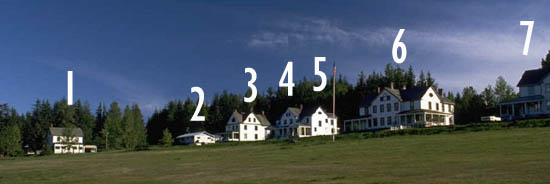
Monopoly
For parents that want their kids to learn about counting,
addition, subtraction, and multiplication, Monopoly is
probably the best board game you can use.
Counting is
taught as the child moves forward a certain number of spaces,
which they determine by adding up the number on the dice that
they have rolled.
They have to subtract money from
their personal pile, or they have to determine how much it
will cost to buy houses and hotels on their properties.
They can even learn about how things become double, how to
make fractions, and how the financial system works (roughly,
of course).
All in all, Monopoly is probably the best
of the math for kids board games if you are trying to teach your kids math.
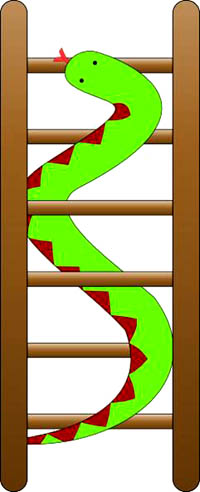 Snakes and Ladders
Snakes and Ladders
The simple board game can present you with a way to teach your
kids math. Most boards have exactly 100 spaces, making it
easier for you to do simple math.
When your child
climbs a ladder, have them do the mental calculation in their
heads to determine how many spaces forward they went in a
single move.
If they drop down a chute, have them
subtract the number of their current space from their original
space to determine how many backwards they went.
As a
twist, have the person that reaches the end first calculate
exactly how many spaces behind him or her, each of the other
players are. Those that don't calculate right move back to the
space where they were before they reached the end.
Fun with Lunch
Meal times can be a very educational time, especially if you
are going to teach your kids about multiplication and
addition.
Say you are a family of 5 people; two adults
and three kids. If each person eats two sandwiches or three
slices of pizza each, how many will you need?
If Jimmy
only eats one sandwich but Daddy eats four and Sally eats 2,
how many will you need?
Almost every simple lunch or
dinner can be used as a moment to teach your kids a bit more
about math, and you will find that there is no end to the kid math lessons if you think creatively.
Coin Counting
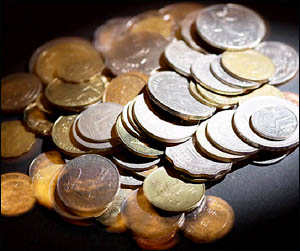 If you have a small collection of change, it can be the
perfect way to help your kids get good at counting, adding,
and multiplying quickly.
If you have a small collection of change, it can be the
perfect way to help your kids get good at counting, adding,
and multiplying quickly.
Say you have a large jar full
of pennies, nickels, dimes, and quarters. Have each child take
a small pile of coins and separate the various sizes.
Once you have separated the coins, assign each child a
specific coin (nickels, pennies, etc.) and have them count
exactly how many there are in the jar.
Another way to
go is let each child count the coins in their piles, add them
up (50 nickels is $2.50, 40 quarters is $10, etc.) and then
add their piles to the piles of the other people.
You
can help your children learn how to count, but with real money
that you can take to get them a nice little snack or surprise
once you are done.
Tips for Teaching Kindergarten Math for Kids the Fun Way
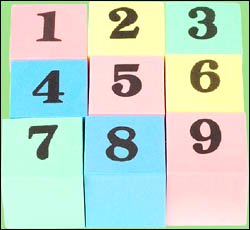 Kindergarten math is going to be a greater challenge than
elementary school math, as the kids are going to be much
younger. These kids won't have a very solid foundation in math,
and they will just be learning to identify simple shapes,
counting from 1 to 10, and other simple math problems.
Kindergarten math is going to be a greater challenge than
elementary school math, as the kids are going to be much
younger. These kids won't have a very solid foundation in math,
and they will just be learning to identify simple shapes,
counting from 1 to 10, and other simple math problems.
They won't know how to count very high, and they may not
even be able to count consecutively.
For those that
are teaching kindergarten math for kids, it is going to be a bit
difficult to come up with activities that will make it easy
for your kids to make quick progress in their math.
To
top it off, your kids are bound to have a very short attention
span. Most preschoolers are only able to sit still for a short
amount of time, and even then their attention is usually
wandering. It can be quite the task to get the kids to not
only sit still, but to pay attention to what you are saying
and participate in the games that you are trying to play with
them.
For those that are going to teach kindergarten
math, my advice to you is to keep the games short, fun, and
very simple. If a game goes on too long, your children will
end up losing interest and will try to go on to something else.
Just make the games last a few minutes each before
moving on to something else.
If the math games are fun, you
will find that they will hold the children's interest for long
enough to teach them something, and you can then go on to
learning something else.
6 Preschool Math Activities
Here are some great preschool math activities that you can do
to help give your children the foundation in mathematics:
Math Races
Math races aren't real races, but they are races that you will
do on the whiteboard or a piece of paper.
Have each of
the children take a colored marker and place it on a piece of
paper that has a number of dots drawn on it.
Give each
child a turn to say the number that you are pointing at, and
they can then move forward that many spaces. Some kids can
identify numbers up to 20 or 30, while others can only go as
high as 10.
Make sure to give each child a chance to "win
the race" according to their ability, and this math for
kids game can help
to improve their ability to both count and recognize numbers.
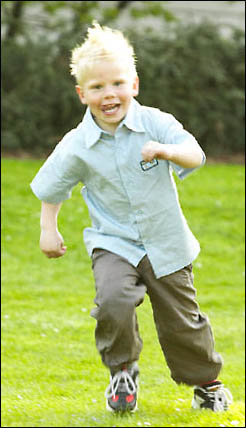 Mother May I
Mother May I
Mother May I is a game where each child asks the mother if
they can move forward, and they have to count the number of
steps, jumps, or leaps that they move.
The kids
obviously have to say "Mother May I" along with each motion,
but the idea of the game is that the kids practice counting.
You can start off with commands like "5 normal steps"
or "8 hops", and then you can move on to commands like "13
baby steps" or "16 frog jumps" that will help the kids to
count higher.
This math game will be a great way for your
kids to practice their counting skills, as they will have to
count from one.
Simon Says
Simon Says is another fun game that you can play to help your
kids learn counting, though it is normally focused on actions.
You can say, "Simon says to touch your nose 5 times,"
"Simon says to jump 8 times," and other simple commands.
Your kids will have to perform the actions a certain
number of times, which will help them to practice their
counting skills.
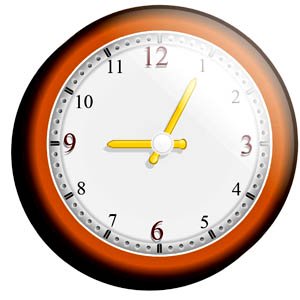 Clock Watching
Clock Watching
Your kids may be too young to learn to tell the time, but they
can at least learn how many minutes have passed between the
big numbers on the clock. In fact, kids of preschool age can
learn simple time telling, but it will be a bit of work to
teach them.
If you want to teach them, explain how the
little hand says the hour, the big hand says the minute, and
give them the chance to try and figure it out.
Help
them to learn, and you will find that with this math for kids
activity they will often pick it
up quite quickly.
Math Fishing
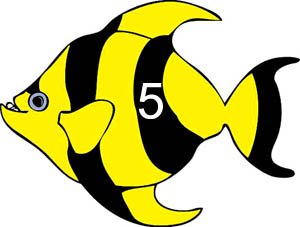 This is a fun math activities game that you can play with your
child's magnetic fishing set, though it will take a bit of
work to customize the game.
This is a fun math activities game that you can play with your
child's magnetic fishing set, though it will take a bit of
work to customize the game.
Cut out a lot of numbers (between
1 and 20) and put paper clips on them. Use small pieces of
paper with double-sided sticky tape on the back to stick
numbers to the fish in the pond.
Each child takes a
paper from the pile, uses the clip to stick it on their
fishing line, and uses the magnet at the end of the line to
pick up the fish that has the same number.
For
teaching your kids number recognition skills, this is a great
math game.
Connect the Dots
Connect the dots is a simple math for kids activity that any kids can do,
provided they can draw lines from one dot to the next.
It will be a good follow up to coordination and art
exercises, and can help your kids to learn to recognize
numbers and count them in sequence.
You can go from 1
to 20, 1 to 30, or even 1 to 50 as the kids connect the dots
and learn to count all the numbers.
5 Fun Math Activities for Older Kids
For your older kids, there are a lot of ways that you can
customize games to be fun math activities for them.
Here are some fun math activities that you can play and do
with your kids:
Chess or Checkers Counting
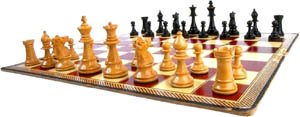 If your kids know how to play chess, it is the perfect choice
for this game. Checkers will do if they don't play chess.
If your kids know how to play chess, it is the perfect choice
for this game. Checkers will do if they don't play chess.
Have the players count each of the moves they make, and
add them up on a piece of paper.
For example, the
horse moves 3 spaces every time, while the bishop can move
between 1 and 7 spaces.
Have the kids tally up the
moves of each piece, and even count up the moves of all the
pieces.
Play a number of games and see who can win
with the least spaces moved by all the pieces. It will be a
challenge to do all the math, but it will be a fun way to
compete to see who can make the least moves.
Cooking Fun
Just getting into the kitchen and cooking will help your kids
lay multiplication math games, cool math games for kids
involving fractions, and simple games of addition.
The
tart has to be sliced into enough pieces for everyone, so how
many pieces does it need to be cut into if there are 5 people
eating?
The cake needs 2 eggs, but it needs 3 ¼ cups
of flour, so how do you measure that?
The kitchen is a
place where math is everything, and you will find that cooking
a few meals with your kids can be a great way for them to
practice their math skills.
Shopping Fun
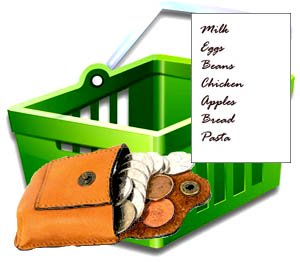 Taking your kids to the supermarket is probably the best way
to help them practice their math skills with real life
problems.
Taking your kids to the supermarket is probably the best way
to help them practice their math skills with real life
problems.
Give each of the kids a certain amount of
money to work with from your weekly shopping budget, and give
them a list of things that they need to buy.
They need
to figure out how much they are going to spend, and what they
can buy with the money that they have.
It may take a
lot longer to do your shopping, but it will give your kids a
chance to see what goes into making the purchases - something
they will need to do when they get older - while also
practicing their math skills in a real life situation.
Clock Watching
Counting the minutes on the clock can be a fun way to teach
your kids about telling the time, but it can be a more
advanced math activity for older kids.
Have each child
write down the time they woke up, the time they brushed their
teeth, used the bathroom, and all the other activities they
did throughout the day.
Have them figure out exactly
how many minutes passed between each activity, and how many
minutes passed between their getting out of bed in the morning
and the time they get into bed in the evening.
You can
help them multiply the number of minutes by 60 to get an hour,
or divide the number of hours by 60 to get minutes in the day.
It can be an amazing math tool, and all within just a
single day.
Connect the Dots Older Kids Style
Connect the dots is usually seen as an activity for smaller
kids, but you can play it through your whole house and make it
a lot of fun.
You can have a treasure hunt running
through the house, with threads leading all around the house
to different math equations.
Your kids will have to do
the math equations to find out which strings to follow on to
the next destination, and they will all have to race to
complete a certain number of equations to see who can reach
the final destination of the prize first.
You can even
leave the prize in plain sight, which can get each kid
hurrying up to make the right calculations in order to reach
the end of the line.
This math for kids activity will take a bit of preparation
and creative thinking on your part, but it can be one of the
most entertaining math games you can play with your kids.
Your Positive Parenting Ally,
Birgitte

Want to stay in touch and get the latest news?
Sign up
for my free newsletter
Parent Coaching
- For Inner Peace, Clarity and a Deeper Connection to Your Child
 Being a parent can feel like a double-edged sword. Life with kids may feel like the greatest gift you have ever received, while at the same being hugely challenging, often leaving you confused, stressed and overwhelmed.
Being a parent can feel like a double-edged sword. Life with kids may feel like the greatest gift you have ever received, while at the same being hugely challenging, often leaving you confused, stressed and overwhelmed.
When we feel like this, we've lost touch with ourselves. We can't hear our own inner voice, and it's difficult to know what is 'right' for us and how to act.
I offer in-depth parent coaching to help you regain your balance and get back in touch with yourself. From a place of inner peace and clarity, your will find your own answers which will help you reconnect with your child from a place of unconditional love and acceptance.
Read more about my parent coaching here.
Where Would You Like to Go Next?
Fun Math Games for Kids
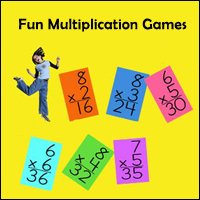 Fun Multiplication Math Games and Educational Times Tables Activities for Kids. |
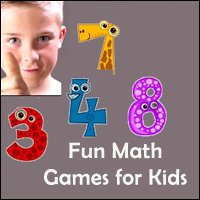 Educational Kids Math Games Cool Math Websites and Physical Fun Math Activities. |
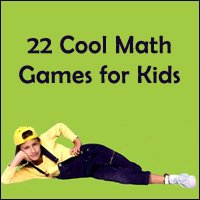 22 Cool Math Games for Kids Fun Math Activities with Multiplication, Addition and Subtraction. |
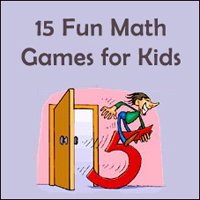 15 Fun Math Games for Kids: Turning Multiplication, Addition and Fraction into Fun Math Activities. |
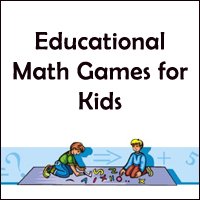 Cool Math Games for Kids and Fun Math Activities for All Ages. |
Fun Science Games and Experiments for Kids
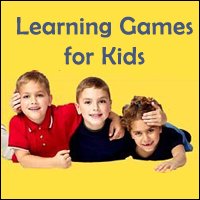 27 Learning Games for Kids A List of the Best Educational Games for Kids. |
 15 Fun Science Projects for Kids - Fun Learning Games at Home. |
 14 Fun Science Experiments for Kids: Guidelines for Kids Science Projects and Learning Games. |
 14 Science Fair Projects for Kids: Easy Guidelines to Fun Science Fair Ideas. |
 12 Fun Experiments for Kids: Easy Science Projects for Kids to Do at Home or in School. |
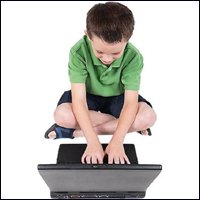 36 Recommended Science Websites for Kids: Science Sites for Kids That Make Learning Fun. |
 Fun Facts about the Solar System for Kids and Fun Kids Astronomy Games. |
Back to the top of this page about Exciting Math for Kids - 16 Fun Math Activities and Counting Games
Go to the Positive Parenting Ally Homepage







